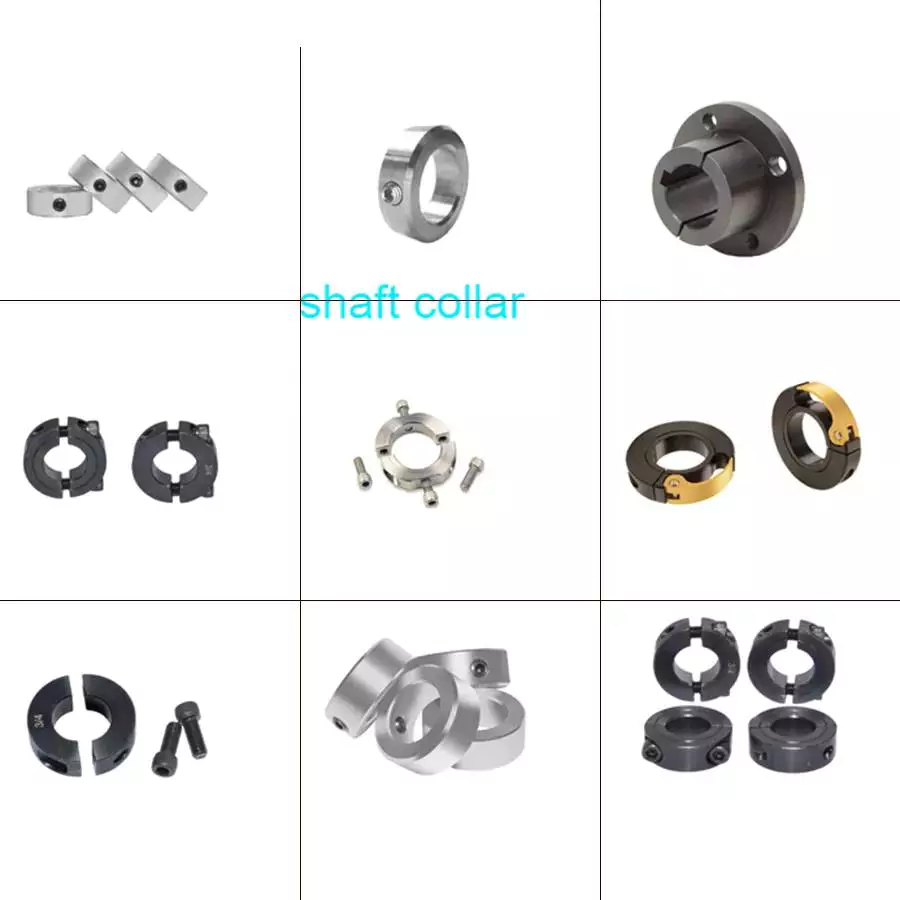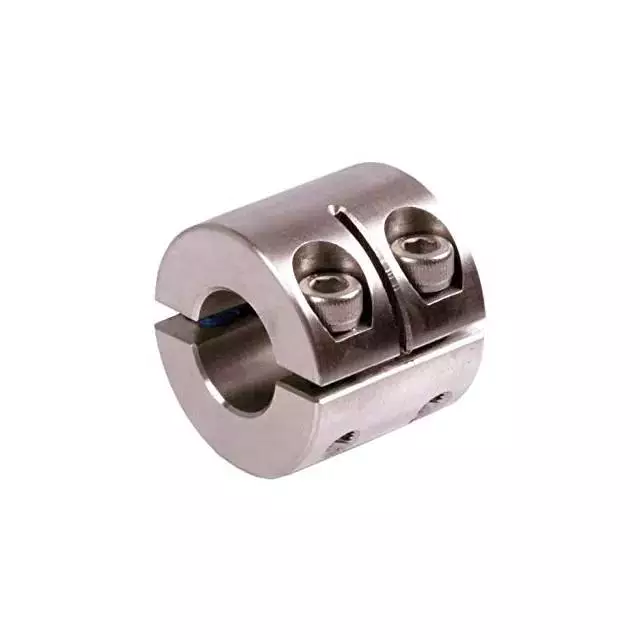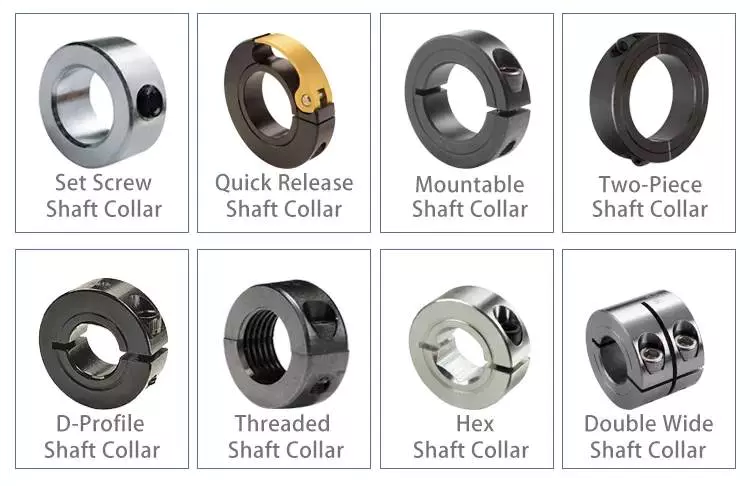Product Description
Stainless Steel Shaft Collar With Set Screw
high precision shaft collars / plastic shaft collars / nylon shaft collars / stainless steel shaft collars / Set Screw Shaft Collars / Custom Set Screw Shaft Collars / Shaft locking Collars / Shaft mounting collars are the most effective when used on a shaft made of a material which is softer than the set screw.
Collar Material: Plastic (nylon), Steel, Stainless Steel, Brass, Aluminum, etc
Collar Finish: Zinc, Nickel, Black, Plain, etc
Collar Inner Diameter: Custom
Collar Outer Diameter: Custom
Collar Width: Custom
Screw Length: Custom
Screw Material: Steel
Screw Size: Custom
Screw Type: Socket Set Screw
Type: Solid Clamping Collar
Notes:Zinc Plated Steel Set Screw Collar. Traditional cost effective collar design
| Application: | Fastener, Auto and Motorcycle Accessory, Hardware Tool, Machinery Accessory |
|---|---|
| Standard: | GB |
| Surface Treatment: | Polishing |
| Production Type: | Mass Production |
| Machining Method: | CNC Machining |
| Material: | Nylon, Steel, Plastic, Alloy, Aluminum, Iron |
| Samples: |
US$ 10/Piece
1 Piece(Min.Order) | |
|---|

What are the steps for retrofitting machinery with shaft collars for improved performance?
Retrofitting machinery with shaft collars can be a beneficial step to improve performance, enhance functionality, or address specific issues. Here are the general steps involved in retrofitting machinery with shaft collars:
- Assessment and Planning: Start by assessing the machinery and identifying the areas where shaft collars can be installed or upgraded to improve performance. Consider factors such as misalignment, slippage, vibration, or inadequate gripping of rotating shafts. Plan the retrofitting process by determining the number of collars required, their sizes, materials, and any additional components or modifications needed.
- Measurement and Shaft Preparation: Accurate measurement of the shaft diameter is crucial to ensure proper fitting of the collars. Use calipers or other measuring tools to determine the shaft diameter at the desired installation points. Clean the shaft surface and remove any debris or contaminants that may interfere with the collar installation. If necessary, smooth out any rough surfaces or burrs on the shaft to ensure a proper fit.
- Selection and Procurement: Select the appropriate shaft collars based on the specific requirements of your machinery. Consider factors such as shaft diameter, collar style (set screw, clamp, or other), material (steel, stainless steel, aluminum, plastic), and any special features required for improved performance. Procure the necessary shaft collars from a reliable supplier or manufacturer.
- Installation: Follow the manufacturer’s instructions for installing the shaft collars. Generally, the installation involves sliding the collar onto the shaft at the desired location and securing it in place. Set screw collars require tightening the set screws against the shaft to create a tight grip, while clamp-style collars may require tightening bolts or screws to achieve a secure fit. Ensure that the collars are properly aligned and seated on the shaft, and tighten the fasteners to the recommended torque specifications.
- Testing and Adjustment: After installing the shaft collars, conduct thorough testing to ensure their proper functionality and improved performance. Check for any signs of slippage, misalignment, or excessive vibration. If necessary, make adjustments to the collar position, tightness of the fasteners, or other factors to optimize the performance. Repeat the testing and adjustment process as needed until the desired performance improvements are achieved.
- Maintenance and Monitoring: Regularly inspect the shaft collars as part of your machinery maintenance routine. Check for signs of wear, corrosion, or any issues that may affect their performance. Lubricate the collars if required, following the manufacturer’s recommendations. Continuously monitor the performance of the retrofitted machinery to ensure that the shaft collars are functioning as intended and providing the desired improvements.
It is important to note that the specific steps and considerations for retrofitting machinery with shaft collars may vary depending on the type of machinery, the complexity of the retrofit, and other factors specific to your application. Consulting the machinery manufacturer’s guidelines, seeking expert advice, or involving professional technicians can help ensure a successful retrofitting process and optimal performance improvements.

Where can I find information on the materials used in manufacturing shaft collars?
If you are looking for information on the materials used in manufacturing shaft collars, there are several sources where you can find relevant information. Here are some common resources to consider:
- Manufacturer Websites: Many manufacturers of shaft collars provide detailed information about the materials they use in their product specifications or technical datasheets. Visiting the websites of specific collar manufacturers and exploring their product documentation or resources section can help you find information about the materials used in their collars. This information may include the type of material (such as steel, stainless steel, aluminum, or plastic) and any specific properties or characteristics associated with the material.
- Product Catalogs and Brochures: Manufacturers often publish product catalogs or brochures that provide an overview of their collar offerings. These catalogs may include information about the materials used in manufacturing the collars. You can request catalogs from manufacturers directly or check their websites for downloadable versions. The catalogs may highlight the material properties and advantages of using specific materials for different applications.
- Material Databases: Online material databases or directories can be valuable resources for finding information about specific materials used in manufacturing shaft collars. These databases typically provide comprehensive information about various materials, including their composition, mechanical properties, corrosion resistance, temperature tolerance, and other relevant characteristics. Examples of such databases include MatWeb, Engineering Toolbox, or specialized materials databases maintained by industry organizations or universities.
- Technical Standards and Specifications: Technical standards and specifications related to mechanical components can often include information about the materials used in their construction. Standards organizations or industry associations may release documents that outline the material requirements for shaft collars or provide guidelines for material selection. Accessing these standards or specifications can provide insights into the recommended materials for shaft collar manufacturing.
- Consulting with Manufacturers or Suppliers: If you have specific questions about the materials used in manufacturing shaft collars, reaching out directly to manufacturers or suppliers can be beneficial. They can provide detailed information about the materials they use, including their composition, properties, and any specific treatments or coatings applied to enhance performance. Contacting manufacturers or suppliers allows for direct communication and the opportunity to address any specific concerns or requirements you may have.
When seeking information on materials used in shaft collar manufacturing, it is important to consider factors such as desired properties (e.g., strength, corrosion resistance), environmental compatibility, and application-specific requirements. This will help you make informed decisions about selecting shaft collars that are suitable for your specific needs and operating conditions.

Where can I buy high-quality shaft collars for industrial applications?
When looking to purchase high-quality shaft collars for industrial applications, there are several options available. Here are some common sources where you can find reputable suppliers:
- Industrial Suppliers and Distributors: Industrial suppliers and distributors specialize in providing a wide range of components and equipment for industrial applications. They often carry a variety of shaft collars from different manufacturers. You can search for local industrial suppliers in your area or explore online industrial supply websites. Some well-known industrial suppliers include McMaster-Carr, Grainger, MSC Industrial Supply, and RS Components. These suppliers typically offer a range of options and provide detailed product specifications to help you choose the right shaft collar for your specific requirements.
- Specialty Manufacturers: Some manufacturers specialize in producing shaft collars and related components. These companies often have a strong focus on quality and may offer specialized solutions for specific applications. Research and identify reputable manufacturers that produce high-quality shaft collars. You can visit their websites to explore their product offerings, specifications, and contact information. Some notable manufacturers in the industry include Ruland Manufacturing, Stafford Manufacturing, Climax Metal Products, and Collars and Couplings.
- Online Marketplaces: Online marketplaces provide a platform for various sellers to offer their products, including shaft collars. Platforms like Amazon, eBay, and Alibaba have a wide range of options available from different sellers. When using online marketplaces, it’s important to carefully review seller ratings, product descriptions, and customer reviews to ensure the quality and reliability of the shaft collars being offered. Look for sellers with positive ratings and reputable customer feedback to increase the likelihood of purchasing high-quality products.
- Local Machine Shops and Fabricators: Local machine shops or fabricators that specialize in machining or fabricating custom parts may also offer shaft collars for sale. These shops often have expertise in working with various materials and can provide customized solutions if needed. Contact local machine shops in your area and inquire about their availability of shaft collars or their ability to fabricate them to your specific requirements.
- Trade Shows and Exhibitions: Trade shows and exhibitions related to industrial components and equipment can be excellent opportunities to explore a wide range of suppliers and manufacturers in one place. Attend industry-specific trade shows or exhibitions and visit booths or displays of companies specializing in power transmission, bearings, or mechanical components. This allows you to interact directly with manufacturers or suppliers, discuss your requirements, and assess the quality of their products firsthand.
When purchasing shaft collars for industrial applications, it’s important to consider factors such as material quality, dimensional accuracy, load-bearing capacity, and any specific requirements of your application. Thoroughly evaluate suppliers, review product specifications, and compare prices to ensure you are getting high-quality shaft collars that meet your needs. Additionally, consider factors such as lead time, customer support, and return policies when making your purchasing decision.


editor by CX 2023-12-12